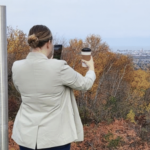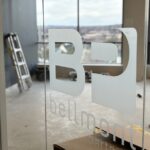These past two years have taught us about living and working during a global pandemic and furthermore, how important paying attention to our mental health can be as we navigate the challenges that come with working from home, hybrid, or making the return to the office. Now more than ever, people are finding that the way they worked in the past is not the way they want to work moving forward. As a result, businesses need to ensure they are providing the type of work environment and culture that keeps their employees feeling valued and engaged.
With mental health in the workplace top of mind, we sat down with Jaime Taets, CEO of The Keystone Group International. She is also a podcaster, speaker and author who works with hundreds of business leaders and CEOs in making sure their businesses’ strategies align with their people and culture in order to ensure a successful, supportive and happy workplace. We chatted with Jaime to hear more about what business leaders can do to establish a conscious culture as they help employees (and themselves) navigate new ways of working.
This is a very strange time when it comes to the working world. Some companies are still entirely remote, some are back full time, and many are hybrid—all of which are causing business leaders to focus on the impact these changes are having on their employee’s happiness and success. How are you helping business leaders navigate these new challenges?
We are having a lot of conversations around conscious leadership and how the requirements of leaders are evolving rapidly. Most of our clients are investing heavily in their leaders right now because they know that will be the competitive advantage over the next 10–15 years around the labor market.
The great news is that more business leaders are open to these conversations as mental health in the workplace is no longer a “touchy-feely,” off-limits topic. But for some, it can still be uncomfortable. We are helping leaders shift their perspective and where they spend their time to help them develop coaching skills to really connect with, and coach their employees. We are also helping them with tools and approach to connect more authentically to build trust and understand the team’s true strengths.
Given it is very likely employees are no longer all in the same building at the same time (or at all), how do business leaders really know how their team is doing and if they are feeling valued and engaged?
It’s definitely a challenge when we are not physically in the same space. The guidance we give leaders is that they have to create intentionality in their communication and approach. Reach out to do video calls with their people outside of just big project meetings or team meetings. They need to connect to them one-on-one more often when remote. And more importantly, use those calls to just connect, not just jump into business topics.
We are also recommending more frequent development conversations, identifying areas they could use their strengths more often and really get a sense for where they are at – are they feeling challenged and feel like they can grow within the company?
For those who are transitioning back to the office, what should business leaders be doing to ensure employees’ needs are being met as they adjust to yet another new way of working?
I think the first thing all business leaders must do is to realize that coming back to work is an adjustment, just like it was an adjustment when we were all sent home. Acknowledge it was hard, but we did it, and this will be the same. This helps build trust and allows for innovative thinking to help keep your talent and grow your business.
As your team transitions back or moves to a new hybrid model of working, I think it is essential to include your team in the plans going forward and have them be part of the culture improvement opportunity you have as you return to the office. The more people feel confident someone is focusing on the culture and how it will be impacted, the more likely they will be to be part of the change.
I also encourage business leaders to have an open and honest conversation with their team about how life has changed, how the business has changed and what small adjustments you might be able to make to align both of those new realities. Don’t be afraid to have these conversations at all levels of the organization, and be flexible. There is no right answer to this situation, so employees and leaders need to keep the lines of communication open. You may need to course correct your approach and plan if it’s not working and your employees will want to know there is flexibility to adjust as you see how things are working.
You talk a lot about how having a positive culture means people leave work feeling better than when they arrived. And furthermore, that work should feel like a beneficial part of life that provides fulfillment beyond income. How are you helping business leaders get a true pulse on their company culture and employee satisfaction, especially given the rise of hybrid and even fully remote workforces?
This is the greatest growth area for our business right now. Companies are realizing that while their culture wasn’t broken, it definitely was not as strong as they thought, and the hybrid environment, as well as the great resignation is causing them to re-evaluate. We use our Impact Model tool to assess the 20 factors of culture to give them a true heatmap on where they have strength and where there are weak points in their culture. Having that external partner assess your culture can be really helpful to identify the areas that as a company and as leaders you are too close to see. We ensure they have a strong plan for where they are going to invest their resources and a strong communication plan to engage the employees in the work. It’s proving to be a true competitive advantage for our clients in retaining and attracting top talent, even in a tough labor market.
You recently wrote a book, “You Are Here” that really has come out at a perfect time as it helps talks about how being “stuck” is a good thing as it can help you get to where you need to be both personally and professionally. Can you tell us why you felt it was important to talk about, and normalize the feeling of being “stuck,” and what are some of the most important words of advice you would give to people who may be experiencing that right now?
We are all tired – as leaders and as employees. The book is serving a dual purpose for the groups we are speaking and training with. It is normalizing the feeling of being tired and “stuck.” We all have points where we feel this way. And it’s also creating a healthy dialogue between leaders and employees around how we bridge the gap and support each other through this period of transition. I am so grateful to have the platform to speak about this topic. Every time I have spoken somewhere, I get a few people who come up to me afterwards in tears because what I said spoke to them and gave them hope. We are at a point where we need to focus on supporting each other and not just on business results. The companies that really understand that will have loyal employees for a very long time.
What’s Brewing at Keystone Group—what’s next?
So much good stuff. We are about done with the manuscript for a Culture book and will share the title in the coming month or two. We are hoping for a launch date in Q1 of 2023, so that will be exciting to really bring our model and approach to the masses and start to impact culture at organizations we don’t even work with. It’s truly our way of creating a ripple effect that will change work environments across the country and hopefully across the globe.
And What’s Brewing for you? What morning and/or evening drinks keep you fueled or relaxed these days?
I’m not a coffee drinker, but I am a huge fan of kombucha during the day and a nice glass of white wine in the evening!







